|
Quickly.…name an advocacy/service project in 2024 whose roots go way back to the
17 th century…. If you guessed homelessness you’re probably a Vincentian, i.e. a member or associate of one of the 225 groups in 150 countries that claim St. Vincent DePaul as patron, founder or inspiration. Homelessness ranked high on Vincent’s agenda. The following is the story of a contemporary effort to end homelessness by followers of Vincent DePaul, the remarkable story of a strikingly successful project. Consider this: in only 6 years, from 2018 to 2023, the FAMVIN Homeless Alliance (FHA) has provided over 10,000 formerly homeless people with secure housing and access to other support services. Current Statistics (June 2024): 68 Countries; 108 projects; 2,523 Houses; 10,256 People Helped The Historical Inspiration: One of St. Vincent’s many creative responses to the plight of poor people in his time involved the use of money bequeathed to him in a royal will to acquire 13 houses for abandoned children. Using sharp business skills, Vincent rented the houses to the Ladies of Charity (AIC), then used the rent proceeds for the missions. The Daughters of Charity cared for and educated the children. St. Vincent also arranged housing for refugees pouring into Paris, victims of war, famine and the plague, as well as others living on the streets, which also involved feeding at times thousands of people. Vincent’s “13 houses” became the metaphor for today’s project to transform the lives of at least 10,000 people experiencing homelessness in as many countries as possible to works towards eliminating homelessness. FHA’s focus on the homeless has three dimensions: People without accommodations--street sleepers People living in temporary accommodations—refugee camps, the internally displaced People living in inadequate/insecure housing—slums, hostels. The 400 th Anniversary: in 2017, with the theme “Welcoming the Stranger,” the Vincentian Family celebrated the 400 years of Vincentian charism to serve the poor by launching a global initiative to address homelessness. Inspired by the Gospel text “When I was a stranger you welcomed me” (Matthew 25), and by Vincent’s words “We should assist the poor in every way and do it both by ourselves and by enlisting the help of others,” the FHA was entrusted with the megaproject, the unique common project of the entire Family from 1 July 2017 until 2025. Collaboration is the key to the success of any major project and the FHA has been particularly focused on increasing the collaboration needed to eliminate the deeply entrenched social problem that is homelessness. Twenty-five branches of the Family have been especially involved and the success achieved so far exemplifies the power of collaboration. The United Nations Connection: As a global project, 2025 was chosen to coincide with the UN’s 2030 Agenda for People and the Planet, 17 Sustainable Development Goals (SDGs) to put the world on a path towards greater prosperity and peace for everyone. This Agenda, approved by 193 Member States of the UN, is ambitious and frankly off track at this time. The Vincentian Family remains especially focused on the advancement of three of the SDGs: No Poverty (Goal 1), Sustainable Cities and Communities (#11) and Reduced Inequality (#10). FHA Initiatives: Besides hosting international conferences on street homelessness, refugees and persons trapped in slums, FHA is planning to offer a global scholarship fund for 50 young slum dwellers from different communities worldwide up to the graduate level. As it continues to expand, FHA has been incorporating discussions of climate change and resultant displacement, the great moral and existential challenge of our time, as well as gender and women-focused themes, because women and girls regularly suffer the most with any social ill. FHA attempts to bring to bear a holistic approach to the project, ensuring that all dimensions of poverty and marginalization are addressed. And it does so with a systemic change mentality, seeking the root causes of homelessness, and involving persons experiencing homelessness in every phase of the project. More than victims, they are potential protagonists, and their voice and participation are critical to create lasting sustainable change. The Jubilee Year 2025: “Hope Does Not Disappoint” is the inspiring theme of the upcoming special year in the Church. FHA is deep into planning to associate its efforts with Pope Francis’s call for tangible signs of hope, positioning itself as an active pilgrim of hope by continuing the expansion beyond 13 houses and 13 countries and by proving that homelessness is not a necessary evil but a difficult issue that humanity can solve. Closing: To have a home is a human right. To have a decent home is to have dignity and a sense of worth. Having a home is key to the circle of life and its demands of job and income, health and education. To have a home is to have opportunity. Having a home is fundamental to achieve Pope Francis’s imperative of the three L’s: land, labor and lodging. FHA is trying to make that happen for as many as possible. Let’s end homelessness. It can be done. We can all join the effort in different ways by searching for local FHA projects, or by donating, collaborating, spreading the word, following FamVin Homeless Alliance on Twitter/X, FaceBook and Instagram, or emailing: [email protected]. Jim Claffey, NGO Representative of the Congregation of the Mission to United Nations
0 Comments
A three-year-old screams “It’s not fair” when she thinks her brother gets something she doesn’t. Another child cries out the same when told it’s time for bed while an older sibling stays up.
They are calling for justice. Because there’s an instinct in us that things should be fair…not equal perhaps but at least fair. As Ms. Mia Mottley, Prime Minister of Barbados, says about social justice, “we know what that is, we learned it from our kids, it’s called fairness.” Most people don’t think it’s fair that very wealthy people pay lower taxes than they do. Or that corporations can simply raise prices or fire workers without good cause. Again, an innate sense of justice tells us when something is just wrong. Even in the more undeveloped areas of the world, where futures seem pre-determined and fixed, with some exposure to the wider world everyone would want greater fairness, with opportunity for everyone, with material help when needed, with everyone’s dignity respected. The United Nation’s 2030 Agenda of Peace and Prosperity for People and the Planet aims at getting humanity closer to that world. And the underlying promise is to leave no one behind. Leave no one behind--progress for all-- is only attainable if material progress is combined with spiritual or ethical values. Recent economic growth has clearly brought prosperity for many, but since much of that growth has come without a link to justice or equity, a few have disproportionately benefitted while many are left in precarious conditions. This is a spiritual issue. A spiritual failure. Society will only be healthy and whole if values like community, the Common Good, and shared prosperity are intentionally pursued. It’s about fairness. The UN agenda is inspired by Human Rights, a universal declaration, affirming that all people have these rights, that rights belong to people not to governments, and that they must be respected. The Social Teaching of the Church inspires others to seek justice and the Common Good, and to challenge the status quo where everything is set up to favor the wealthy and well connected. Although not well known, the Social Doctrine builds on its roots in Scripture and is authentically pro-life because it defends and promotes life from womb to tomb—“I came that you might have life, and life in abundance.” The Social Teaching fosters a mindset to seek and understand the root causes of injustice and to promote changes in the systems and structures that cause and keep people in poverty and misery. Professor Cornell West says it well: “Never forget that justice is what love looks like in public.” In the Vincentian tradition we find Blessed Frederic Ozanam, principal founder of the Society of St. Vincent de Paul, a forerunner of Social Teaching with his calls for pensions and worker rights well before the earliest formulations of the doctrine. He tells us “Go to the poor”, listen and learn, and complement charity with work for justice. Inspired by the Universal Declaration of Human Rights, Catholic Social Teaching and most of by all our shared charism to serve the poor, The Vincentian Family NGOs work to bring systemic change for people in poverty through our collaborative work at the UN doing political advocacy, a new level of charity. It involves navigating complicated concepts and constructs like Social Protection Floors, the Multi-Dimensional Polycrisis of Inequality, and Global Financial Architecture…but in the end it’s simply all about Fairness. Jim Claffey, NGO representative of the CM to the UN In the last article of this series, Behind at Halftime, we looked at how far behind the world finds itself in achieving the 2030 United Nations Agenda and its 17 Sustainable Development Goals.
This program for a better world for all is built around 5 P’s: People, Planet, Prosperity, Peace and Partnerships:
If we focused on people and the planet, we could reach a level of some prosperity, some peace for all. The 17 Goals are things everyone should want, No Poverty and Zero Hunger for starters. It is an agenda designed to unite the world. The COVID-19 global experience should teach us that the only way forward is one of partnerships and mutual collaboration. But another P always forces its way in and gets in the way: Profit. As in greed. Profit over people. Personal gain over the common good. The profit and power motive not only blocks the shared agenda but also leads to the denial of human rights, reducing their universal character to conform to narrower national interests, and political and financial decisions favoring the few over the many. The profit-first model prevalent today produces inequality, the root of all of our social ills (Pope Francis). The world’s financial architecture must change, “development” must be re-thought, and must go beyond GDP as a measure of a government’s performance. Other measures like The Health Happiness and Wellness Report or the UN’s Our Common Agenda, Policy Brief 4 Valuing What Counts include many other factors and measurements that provide a fuller picture of economic growth and its impact on people. The report Toward a More Inclusive Society* puts it simply and directly: “International funding agencies, companies, foundations and governments at times act solely to promote their own interests” yet “predominantly market-based and economic-oriented solutions fail to address the multidimensional nature of the human person in relation to other people, the environment and society.” We say Leave No One Behind but actually whole nations are being left behind because our current “development” model invests only where and how profit can be extracted, the infamous “return on investment” that is valid when done reasonably, and destructive when unbridled. What must be done? In our own ways, in our work and in our neighborhoods, with friends and those around us, in all we do, we can build community. We must pray incessantly for community, for inclusiveness, for the Common Good. We can use our voice and our vote to choose unity, mutual respect and human solidarity over all forms of divisiveness. Our shared humanity should guide our thinking and our values. Let’s be very clear about this. If Profit continues to dominate the positive Ps, if the 2030 Agenda is not realized, it will not be the fault of the UN. The UN is a platform, owned and operated by Member States. It will be a colossal failure of the 193 nation-members unable—or unwilling—to put the Common Good--and their own people—ahead of everything else. It will be because Countries choose business as usual, the pursuit of narrow short term goals, instead of collaboration for major systemic change. It will be because wealthy nations and their financial instruments continue investing for maximum profit, instead of advancing a more equitable balance among nations. Individualistic tendencies never lead to true solidarity. *Toward a More Inclusive Society, the Forum of Catholic Inspired NGOs Jim Claffey NGO Representative of the Vincentian priests and Brothers to the United Nations If this were a sporting event, the coach would be screaming. The 193 Member States of the United Nations pledged to create a world of peace and prosperity for People and the Planet by 2030. A promise, almost a dream. A pledge to eliminate poverty and hunger, provide a clean environment, and a life harmonious with nature for everyone. The current assessment:
The 193 nations, “Member States” of the UN, have so far failed to deliver. Let’s be real. We will never totally eliminate poverty in spite of SDG 1: End Poverty. It is a social ill, the product of growing inequality and the policy decision made by too many leaders using economic systems favoring only those at the top. Greed abounds; the Common Good in short supply. But it is possible to eliminate extreme poverty, providing vast improvements in the quality of life for everyone. Were we to realize the SDGs the world would be vastly improved for every person. Not a paradise but a world with less poverty, no hunger, a climate under control, and life with dignity. The SDGs are not on track. The pandemic was a huge setback but not entirely responsible for the disappointing results. At this point tweaks are useless. Governments must stop talking and start running, in the words of one youth delegate to the UN, towards implementation of the goals. This was the conversation at the UN during its annual High Level Political Forum in July. The president of the General Assembly says we’re stuck on Old Fashioned thinking and approaches, business as usual, narrow national self-interests trumping global solidarity, and spending development funds with an eye on profit instead of the Common Good. We need non-conventional thinking based on science and an absolute commitment to inclusion and mutual solidarity. “To save the world we must transform the world.” Quite a tall order. WHAT MIGHT SPIRITUALITY PROVIDE HERE The process of shared sustainable development needs an injection of spirituality, a “Unitive” approach. A sense of shared belonging-- to one another, to nature, to one human family in the increasingly interconnected nature of everything. We could understand “That all might be one” not only as an ecumenical call but an existential necessity. The pandemic should have taught us that we’re not safe until everyone is safe. We must stop “othering” those outside our “tribes.” If we all “belong” we will build the Common Good. Vincentian Spirituality can make a valuable contribution by helping to address one of the key SDG mantras: “leave no one behind.” People in poverty are the ones always left behind! The last to be considered, the last to be favored. They are at the heart of our Spirituality and without people in poverty our charism makes little sense. The marginalized and homeless, migrants and refugees, the disadvantaged…to them we go, with them we share the Good News and together we build the Kingdom. Our focus is critical for the UN’s 2030 Agenda. So we might: + Pray for the UN’s efforts to create a better future for everyone; + Sharpen our analysis of issues and events through the lens of our charism; + Continue to advocate for the homeless (common project of the Vincentian Family) Jim Claffey NGO representative of Vincentian priests/brothers to the UN At the recent Multi-Stakeholder Hearing on Universal Health Coverage (UHC), the Congregation of the Mission offered a written statement in support of UHC and good health and wellbeing globally. Below is the statement offered to the hearing:
“The Congregation of the Mission would like to emphasize our unwavering support for Universal Health Coverage and the need for it to be implemented for all people, regardless of their nationality or background. Health is a human right, and everyone deserves the opportunity to live as healthy and comfortable of a life as possible. To achieve this, the United Nations needs to continue supporting medical and public health efforts aimed at both disease prevention and treatment. Effective UHC systems must promote healthy lifestyles and work to prevent disease where possible to lessen the burden of preventable diseases on health systems, but also support and equitably provide treatments for diseases that do develop. We would also like to highlight the importance of ensuring universal health coverage is able to reach the most marginalized, such as, but not limited to, refugees, people experiencing homelessness, and disabled people, and meet their long-term or complex health needs. It is pivotal that in the UHC systems we envision, no person’s health needs are considered too complicated or too urgent. Improving health is integral to improving livelihoods, and the benefits of implementing UHC go far and beyond health and span across financial-wellbeing, economic opportunity improvement, and gender equity. It is essential that the UHC systems we envision for the future of our global society meet the needs of all, not some, and in order to achieve this, we must listen to communities and individuals and involve them as equal and valuable stakeholders to ensure the needs expressed by communities are being met and accounted for in such UHC systems.” Gracie Bagdon Intern One evening in the early 1970s, Michael Pachovas and a few friends wheeled themselves to a curb in Berkeley, Calif., poured cement into the form of a crude ramp, and rolled off into the night. For Pachovas and his fellow disability advocates, it was a political act, a gesture of defiance….It was also pragmatic. Despite their unevenness, the makeshift sloping curbs provided the disabled community with something invaluable: mobility….
So begins a powerful story told in the 2017 Stanford Social Innovation Review by Angela Glover Blackwell. That simple “curb cut” helped end the nightmare of moving along city streets in a wheelchair, like running a dangerous obstacle course. Unlike accessibility measures for buildings required by government regulation, street mobility was not yet a priority. Now that’s creativity! Identifying a problem and responding effectively with simple resources. Curb cuts were not entirely new. The first appeared in 1945 in Kalamazoo MI. But the Berkeley cut began to change the way the country thought about access, mobility and the needs of more vulnerable communities. And then something entirely unexpected thing happened. With this small change, everybody benefited—not only people in wheelchairs but parents pushing strollers headed straight for curb cuts. So did workers pushing heavy carts, business travelers wheeling luggage, even runners and skateboarders. There’s an ingrained societal suspicion that intentionally supporting one group hurts another. That equity is a zero sum game. But in fact, it’s not a pizza—my slice doesn’t diminish the pie for others! Everyone wins. St Vincent de Paul would be proud. After all one of hallmarks of the great Patron of Charity was his genius for networking and collaboration, as well as creative responses to the problems and needs of the impoverished of his time. One of his most often repeated quotes reminds us LOVE IS INVENTIVE EVEN TO INFINITY. A powerful statement…but also a challenge to his followers: how creative are we Vincentians today in following Christ the Evangelizer and Servant of People in Poverty. How inventive of pastoral methods and tools in bringing the Good News? Because if we always do what we’ve always done, not much will change. It’s interesting to imagine what St. Vincent would do with the social tools of today that he did not enjoy in the 17th century: social analysis, democracy, economic systems, systemic change thinking and most of all social media! His creativity would flourish and there would be no stopping him in accomplishing serious and lasting structural change. Now not all of us are creative visionaries. That’s a special gift. Many of us are more managerial, we can administer a project, keep it on track and get good results. But we can go beyond that by critically analyzing our methods and seeking to incorporate new—and better—ways to carry out our ministry. As Vincent’s followers, seeking to reflect his charism in this century with its current needs and challenges, those we serve deserve our efforts in this regard. How can we be more creative?
Love is inventive even to infinity. A wonderful conviction, and a challenge! Jim Claffey NGO Representative of the Vincentian priests and brothers to the UN How are you doing with yours? New Years’ resolutions, a common practice, and a good one if it focuses our energy and determination towards valuable goals. But also a practice that can make us laugh—or cry—6 months later upon review of how well we’ve done with it!
There are lots of resolutions at the United Nations. Documents upon documents. About justice and peace, human rights, equitable development and protection of those less fortunate. How much of it is real, how many resolutions actually matter? Only if they make it into national policies, i.e. from UN pronouncement to Member State policy and practice. One historic resolution, achieved by the Vincentian Family NGOs and allies through persistent effort over four years, establishes homelessness as a stand-alone issue. Previously lumped in as one aspect of poverty, homelessness is now seen by the UN as its own issue, to be addressed as such. General Assembly Resolution 76/133 (16 December 2021) reiterates that the eradication of poverty, hunger and malnutrition, in particular as they affect people experiencing and at risk of homelessness and other people in vulnerable situations, is crucial for the advancement of global sustainable development. This means something, this matters. The Secretary General must report this year on what the UN has done to reduce homelessness, and countries submitting Volunteer National Reviews in 2023 are to include this issue in their reports. We will soon see at least glimpses of the impact of the Resolution in these reports. We know how to end homelessness. Although complex, it is not an unsolvable problem. Studies consistently show that the majority of people stay out of homelessness when they have access to permanent housing they can afford. So Housing First, with appropriate support services. Since the Vincentian Question always is “What Must Be Done,” what can we do to address homelessness:
Jim Claffey NGO Representative of the CM to the UN I wonder if it’s even possible to say something new on climate change. There’s so much material available about it already, dissecting the issue from every angle. By now everyone should have heard something of the disaster that awaits humankind if drastic action isn’t taken soon. And so many others, especially island-dwellers, know about it from lived experience.
The recent COP27 (Conference of the Parties on climate, 27th annual session) on climate action is widely considered another lost opportunity, in large part because of the active presence of 600 fossil fuel representatives, amazingly—and tellingly—some even as part of several nations’ official delegation. So for many climate activists, another hope dashed, although some progress was made on establishing a Loss & Damage Fund (more on that below). Maybe we should just meditate often on Laudato Si to find hope. My generation dropped the ball on climate change, no doubt. But I’m somewhat optimistic about significant Climate Action BECAUSE OF YOUNG PEOPLE, who are responding in increasing numbers and with creativity, at COP and beyond. Let me tell you about one example from the Vincentian Family. On December 2nd, @ Niagara University, I was privileged to co-sponsor (the NGO Office of the Congregation of the Mission to the United Nations) with Justice House*/Niagara U, and participate in a student-led simulation of a UN event on climate action. The brain child of a Fulbright scholar Niagara student, the all-day event was orderly, sober and as realistic as a simulation could be. Apart from a tweak here or there, the professors present did not have to intervene to direct the event. I would not have believed that you could keep 40 college students in one room, in totally disciplined demeanor, from 9 to 5. Yet there we were in a visually impactful room with flags of all nations, conference tables, 8 pages of event instructions, comments and proposals researched and written by the students themselves, who then played the role of ambassadors of the different nations. Debate and parliamentary procedure followed, ending with well-articulated final proposals on creating a Loss and Damage Fund whereby wealthier nations—AKA the more guilty on climate damage—provide resources to poorer nations—AKA those who pollute less but suffer more-- with reasonable suggestions on funding to make it happen. The event included a brief presentation, and a Q & A, on COP27 with Lisa Kurbiel (Niagara and St. Johns grad), Director of the UN Development Fund and the Joint Fund for the 17 Sustainable Development Goals, the 2030 UN Agenda for Peace and Prosperity, for People and the Planet. Takeaways? For me, a slice of optimism on climate action. Young people “get it” and are trying to do something about it. This event was limited in scope to a university (and to those following online) but emblematic of what students and young people in general are doing globally to advance the Rights of Nature and to foster meaningful and critical Climate Action. Personally the event also gave me yet another reason to be proud of our Vincentian Universities. Conclusions? Let’s increase our support for young people. In our ministries let’s listen to them and trust them. Let’s facilitate their involvement on the social issues of our time, and welcome their natural enthusiasm. They do things differently, they communicate in their own ways. But they can provide that burst of energy and insight that many organizations and institutions, including the UN itself, can clearly benefit from. Jim Claffey NGO representative of the Congregation of the Mission to the United Nations *Justice House @ Niagara is an exciting new project to create a learning community centered on the pursuit of justice, offering innovative programming and initiatives to help students examine the meaning of justice and inspire them to pursue their own vocations as advocates for justice. Overheard in the parking lot as folks left the Monday Miraculous Medal Devotions….I heard something about Vincentians at the United Nations…do you know who they are…or what they do there?
Yes it’s true. And it’s good news indeed. The Vincentian Family, a huge umbrella of 165 different groups—congregations, institutes, associations—has two million members working in different ways across the glove, on behalf of people in poverty. Though imperfect and in need of serious reform, the United Nations remains the unique global space for international dialogue and collaborative efforts. If the UN did not exist, something like it would have to be invented. It provides the only space where all 193 Member States can meet on mostly equal footing to discuss the great issues of the day: war and peace, poverty and hunger, social development and human rights. And as a global community, the Vincentian Family should be present and active at the world’s unique global organization because the Family has a story to tell, a compelling one, about people trapped in poverty. This is an important story and one the Family is well positioned to tell, first because of our great legacy of charity dating back to the 17th century, the creative and effective work of St. Vincent de Paul and St. Louise de Marillac for poor people, efforts that continue in so many ways today. Vincentians know the stories of poverty first-hand, not from books or committees but from personal contact with people struggling in poverty. Their voices must be raised, they must be helped to find their voice, and that voice needs to be heard at the highest levels of governments. Five branches of the Family have active participation at the UN:
The representatives also work to assist migrants and refugees, to end human trafficking, to foster economic and social development, and to promote the status of women. All of these efforts are addressed through the lens of “systemic change,” the pastoral method that seeks to change the root causes—not the symptoms-- of social ills to make real and lasting change possible for those trapped in poverty. It is a mission St. Vincent himself would be proud of. And for those of us charged to carry it out, it is an honor indeed. Jim Claffey NGO Representative of the Congregation of the Mission 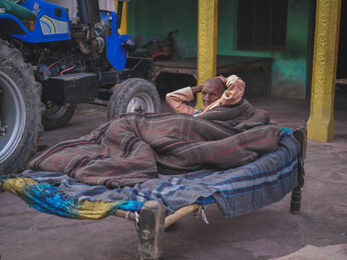 What a beautiful thing to imagine: no poverty. Everyone in the world with their basic needs met. The majority would not be wealthy, but no one would live in poverty. Too much to imagine? An impossible dream? Perhaps. But “nothing happens without first a dream.” And so the proposal of the United Nations in its 2030 Agenda for People, Prosperity and the Planet proposes 17 Sustainable Development Goals as the roadmap. Accompanied by the key mantra “leave no one behind” for this is a global proposal. And Goal #1 is No Poverty. SDG1 has a broad objective: “Ensuring that the entire population and especially the poorest and most vulnerable have equal rights to economic resources, access to basic services, property and land control, natural resources and new technologies.” When 193 countries signed on to this UN 2030 Agenda, they pledged to create sound policy frameworks at the national, regional and international levels, based on pro-poor and gender-sensitive development strategies, with social protection systems and measures, to eradicate poverty. What is poverty? How we define things shapes how we address them. Poverty is much more than a lack of income. The poorest among us are often hungry, have less access to education, regularly have no light at night, and suffer malnutrition and poor health. They may also suffer social exclusion and discrimination. And poverty is intrinsically linked to housing and neighborhood, clean water and sanitation, as well as employment. No surprise! Systemic change, the Congregation’s specific method of evangelizing, reminds us that nothing happens in isolation, that everything is connected. And for Vincentians, whose legacy from the great Vincent de Paul is to evangelize and serve those in poverty, ending poverty would be a dream come true. Global Poverty: the numbers vary because different measures are used. But it may surprise some readers to hear that most people live in poverty; two-thirds of humanity live on less than $10 a day. That’s one in every nine people. What a social sin that cries out to the heavens! Extreme Poverty: The UN estimates that 10%, or 734 million people, suffer extreme poverty by living on less than $1.90 per day. The world was steadily lowering these astounding numbers until the COVID pandemic of 2020. Eradicating Poverty: What would it take to eliminate the scourge of poverty? In a word, radical change. A conversion. Turning “business as usual” upside down. Some of the necessary changes might at least include:
This is obviously a utopian list, proposing huge and almost unimaginable changes for policy-makers across the world. Each point is a lofty goal requiring step-by-step strategies and programs, while remaining open to ongoing refinement according to real-world experience and reasonable possibilities. Surely we won’t eliminate global poverty by 2030, and maybe never in an absolute sense. But to make significant strides in this decade, at least on extreme poverty, and then more progress in the next…who knows? In any case, no poverty. What an amazing thing to imagine. Jim Claffey NGO Representative of the CM to the UN |
Categories |
Congregation of the Mission - Vincentians
United Nations Office
246 E 46th Street
Vincentian International Network For Justice, Peace and Integrity of Creation
United Nations Office
246 E 46th Street
Vincentian International Network For Justice, Peace and Integrity of Creation
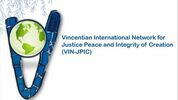


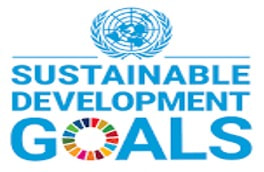
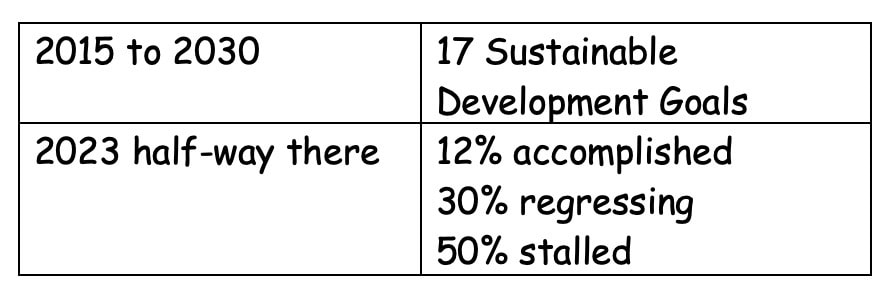
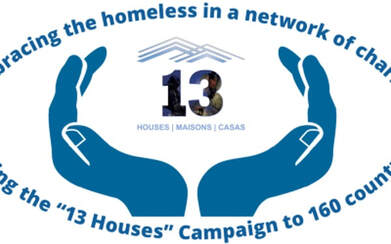
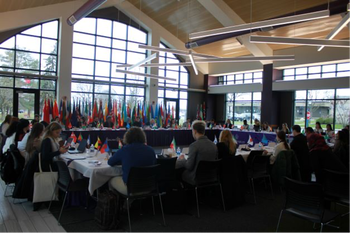
 RSS Feed
RSS Feed